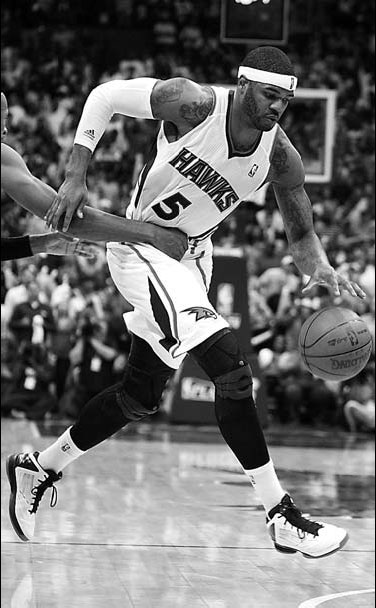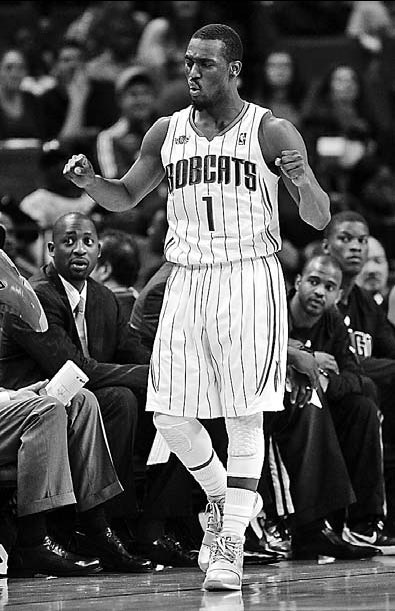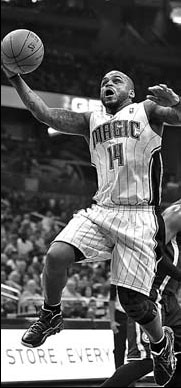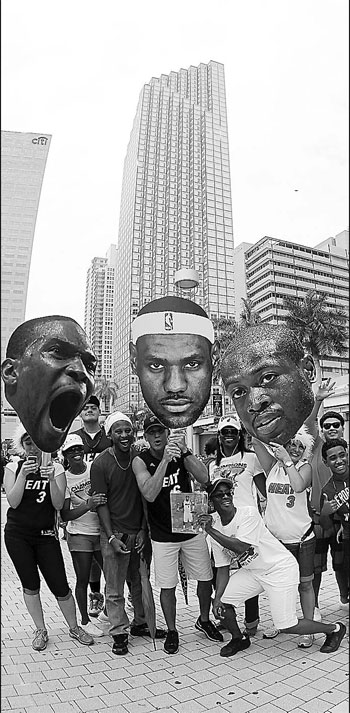Heat will burn while other teams smolder
Updated: 2012-10-03 07:18
(China Daily)
|
|||||||||
Just two years ago, the NBA's Southeast Division had four teams in the playoffs. Now, the Southeast is the home of the defending champ ... and maybe not much else.
While the Miami Heat got stronger, the two other Southeast teams that made the playoffs last season each lost a perennial All-Star. The Hawks aren't in nearly as bad a shape as the Orlando Magic, but their four-year run as a top-five team in the East may be over.
The Washington Wizards look ready to leap-frog the Magic and challenge for a playoff spot. The Charlotte Bobcats do not.
Overall, Dwight Howard's departure will drastically change the complexion of the Southeast. No longer do the Heat have a serious challenger in their own division, and those Florida back-to-backs just got easier for every other team in the league. Here's a deeper look at some key numbers from last season in the Southeast Division, and how those might change this year.
Capsules by Associated Press

Atlanta Hawks
Record: 40-26 Pace: 92.5 (23) Off Rtg: 102.4 (15) Def Rtg: 98.6 (6) Net Rtg: +3.8 (6)
Pace = Possessions per 48 minutes
Off Rtg = Points scored per 100 possessions
Def Rtg = Points allowed per 100 possessions
Net Rtg = Point differential per 100 possessions
The Hawks were the third-most improved defensive team last season, allowing 6.1 fewer points per 100 possessions than they did in 2010-11. But now, you have to wonder how much of a step back they're going to take offensively in the wake of Joe Johnson's departure.
The Hawks' offense fell off dramatically when Johnson stepped off the floor last season. They scored a rather efficient 105.1 points per 100 possessions with Johnson on the court, but just 97.3 with him on the bench.
Of course, most of last season was played without Al Horford. So while the Hawks are losing one All-Star, they're also getting one back. And if you look back over the past two seasons, the Hawks' offense didn't suffer much when Johnson went to the bench, as long as Horford and Josh Smith were still on the floor.
In 405 minutes over the past two years with Horford and Smith on the floor without Johnson, the Hawks scored 103.4 points per 100 possessions, just a slight drop-off from the 103.6 they scored (in 2,346 minutes) with all three on the floor together.
Replacing Johnson with Devin Harris and Lou Williams could help the Hawks in one offensive category. As talented as he is, Johnson doesn't get to the free throw line very often, and he attempted just 20 free throws per 100 field goal attempts last season. As a team, the Hawks ranked 21st in free throw rate.
Harris and Williams attempted 39 and 37 free throws per 100 field goal attempts respectively.

Charlotte Bobcats
Record: 7-59 Pace: 93.6 (17) Off Rtg: 92.3 (30) Def Rtg: 107.8 (30) Net Rtg: -15.5 (30)
Not only did the 2011-12 Bobcats have the worst winning percentage in NBA history, but they were the first team in 19 years to finish dead last in both offensive and defensive efficiency. That all means they can only get better.
The additions of Brendan Haywood and Michael Kidd-Gilchrist should certainly help the Bobcats defensively. But neither is likely to provide much of an offensive boost.
Still, they can get better offensively if new coach Mike Dunlap just gets them to take better shots. The Bobcats didn't do themselves any favors with their shot selection last season.
Charlotte took 39.6 percent of its shots from mid-range (between the paint and the 3-point line). That was the highest rate in the league for the most inefficient shot on the floor, worth 0.77 points per attempt across the league last season.
Shots from the restricted area were worth the most (1.19), with corner 3-pointers (1.13) right behind them. And the Bobcats' other problem was that only 16.3 percent of their 3s came from the corners. That was by far the lowest rate in the league, with three teams having a rate more than double it.
The good news is that two of the biggest culprits in that regard are gone. When he was with the Bobcats, Boris Diaw attempted only two of his 86 threes (two percent) from the corners. And D.J. Augustin attempted only 21 of his 164 (13 percent) from the corners.
Of course, no Bobcat attempted more 3s than rookie Kemba Walker, who's still in Charlotte and who took only 13 of his 215 3s (six percent) from the corners. Not coincidentally, Walker was the third-worst 3-point shooter in the league among the 67 players who attempted at least 200 shots from beyond the arc.
Perhaps Dunlap can run some offensive sets that have Walker spot up in the corner, so that he can realize it's an easier shot.
Orlando Magic

Record: 37-29 Pace: 91.2 (29) Off Rtg: 102.4 (14) Def Rtg: 101.7 (14) Net Rtg: +0.7 (15)
To get an idea of what kind of team the Magic might be without Dwight Howard, we can take a look at their numbers when he was off the floor last season. In those 1,123 minutes, the Magic had the point differential of a team that would win 23 games in an 82-game season.
But the Magic also lost Ryan Anderson, who had the best per-possession plus-minus on the team and held it together somewhat in those minutes that Howard was out of the game. The Magic were outscored by just one point in 757 minutes with Anderson on the floor without Howard.
When Anderson and Howard were off the floor, the Magic were particularly awful, getting outscored by 15.1 points per 100 possessions. That's on par with last season's Bobcats.
This season won't be that ugly, because the Magic did get a couple of decent players back in the trades that sent Anderson and Howard packing. And those 367 particularly awful minutes were a small sample size, with (obviously) no opportunity to develop any chemistry between the Magic's Anderson and Howard-less lineups. No lineup without Anderson and Howard played more than 37 minutes together.
Still, it's clear that Howard wasn't the only impact player that the Magic lost this summer. It's also clear that this is going to be a long season in Orlando.
Washington Wizards
Record: 20-46 Pace: 95.1 (7) Off Rtg: 97.8 (28) Def Rtg: 103.8 (24) Net Rtg: -6.0 (26)
The Wizards are another team that underwent a major overhaul this summer, adding some stable veterans to their young core.
The Wizards already got a little more stable when they traded JaVale McGee for Nene in March. They were actually a very good team in Nene's 283 minutes, outscoring their opponents by 7.5 points per 100 possessions and were particularly strong defensively (94.3 points per 100 possessions allowed).
You would think that Trevor Ariza and Emeka Okafor, acquired from New Orleans for Rashard Lewis, would be a strong defensive combination. But over the past two seasons, the Hornets allowed 103.7 points per 100 possessions with Ariza and Okafor on the floor together, a point more than the Hornets allowed overall (102.7).
The Hornets weren't particularly great offensively with Ariza and Okafor together either, even when they had Chris Paul running the show. So it will be interesting to see if the pair can make an impact on either end of the floor.
Where the Hornets need most help is perimeter shooting. They ranked 14th in field goal percentage from the paint last season, but ranked 23rd from mid-range and dead last on 3-pointers.
Ariza will shoot well from the corners, but he's not going to help the Wizards' shooting otherwise. They'll need to hope No 3 pick Bradley Beal is ready to contribute, and that John Wall has developed a jumper over the summer.

Miami Heat
Record: 46-20 Pace: 93.7 (15) Off Rtg: 104.3 (6) Def Rtg: 97.1 (4) Net Rtg: +7.2 (3)
It was interesting that Bill Russell, in an interview with NBA.com, said LeBron James played the Finals "the way he's always played", because James' performance in that series was actually pretty unique.
Going back to Game 6 of the Eastern Conference finals, James scored 16 or more points in the paint in each of the last seven games of the season, the longest streak of his career. Meanwhile, over the last six games, he made fewer buckets from outside the paint (eight) than he had in any six-game stretch of his career.
So in winning his first championship, James was more of an interior player than he had ever been. Six or seven games is a small sample size, but you have to think that there will be some carryover into the coming season.
We do know the Heat will asking James to play big more often, as they did in the playoffs. In the regular season, Chris Bosh played 90 percent of his minutes with another big man. In the postseason, only 39 percent of Bosh's minutes were played with another big.
The move to go small paid off, especially offensively. The Heat scored 111 points per 100 possessions in the playoffs when Bosh was the only big on the floor, and they scored just 101 when he was out there with Udonis Haslem or Joel Anthony.
The addition of Ray Allen obviously means the Heat will play small more often. That gives James the opportunity to keep on playing big.
(China Daily 10/03/2012 page11)

 'Taken 2' grabs movie box office crown
'Taken 2' grabs movie box office crown
 Rihanna's 'Diamonds' tops UK pop chart
Rihanna's 'Diamonds' tops UK pop chart
 Fans get look at vintage Rolling Stones
Fans get look at vintage Rolling Stones
 Celebrities attend Power of Women event
Celebrities attend Power of Women event
 Ang Lee breaks 'every rule' to make unlikely new Life of Pi film
Ang Lee breaks 'every rule' to make unlikely new Life of Pi film
 Rihanna almost thrown out of nightclub
Rihanna almost thrown out of nightclub
 'Dark Knight' wins weekend box office
'Dark Knight' wins weekend box office
 'Total Recall' stars gather in Beverly Hills
'Total Recall' stars gather in Beverly Hills
Most Viewed
Editor's Picks

|

|

|

|

|

|
Today's Top News
Health new priority for quake zone
Xi meets US top military officer
Japan's boats driven out of Diaoyu
China mulls online shopping legislation
Bird flu death toll rises to 22
Putin appoints new ambassador to China
Japanese ships blocked from Diaoyu Islands
Inspired by Guan, more Chinese pick up golf
US Weekly

|

|







